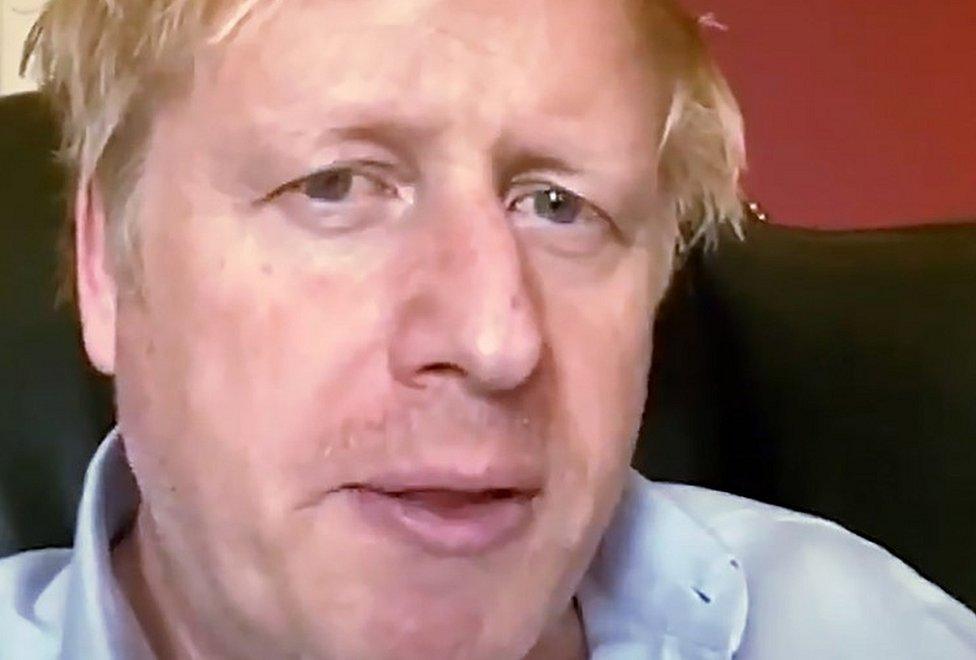Coronavirus: We could have done things differently, says PM
- Published
Boris Johnson: We followed scientific advice
Boris Johnson has admitted the government did not understand coronavirus during the "first few weeks and months" of the UK outbreak.
The PM told BBC political editor Laura Kuenssberg there were "very open questions" about whether the lockdown had started too late.
Mr Johnson also spoke of "lessons to be learned" and said ministers could have done some things "differently".
Labour accused the government of "mishandling" the crisis.
More than 45,000 people in the UK have died after testing positive for coronavirus, government figures show, with almost 300,000 cases confirmed.
Last week, Mr Johnson promised an "independent" inquiry into the pandemic, but no details have been given of its scope or timing.
Previously, the prime minister has said he took the "right decisions at the right time", based on the advice of scientists.
But, in an interview with Laura Kuenssberg to mark the first anniversary of his entering Downing Street, he said: "We didn't understand [the virus] in the way that we would have liked in the first few weeks and months.
"And I think, probably, the single thing that we didn't see at the beginning was the extent to which it was being transmitted asymptomatically from person to person."


Mr Johnson wants to use the government's experience of what happened during the pandemic to speed up his agenda, to "double down on levelling up", as he puts it in his peculiar political jargon.
In other words, to push ahead with more determination, and less fudge in Whitehall, with the changes that he says will actually improve the lives of voters, particularly those who voted Tory for the first time in 2019.
While preparing the NHS for a potential second surge, he clearly wants to concentrate on what's next, not what's gone before.
But perhaps until the government is really ready to acknowledge what has happened, the questions will continue - and the public may still feel anxious about whether they can really trust ministers to handle a second surge next time round.
Just as 366 days ago, optimism is Boris Johnson's trademark.
But if the last few months have shown anything, it is that the real challenge of life in power, is that events that can surprise.

The prime minister added: "I think it's fair to say that there are things that we need to learn about how we handled it in the early stages...There will be plenty of opportunities to learn the lessons of what happened."
The UK went into full lockdown in late March, which critics say was too late and cost lives.
Mr Johnson said: "Maybe there were things we could have done differently, and of course there will be time to understand what exactly we could have done, or done differently."

Boris Johnson was himself diagnosed with coronavirus in March
He added that these were still "very open questions as far as [scientists] are concerned, and there will be a time, obviously, to consider all those issues".
On Friday, the government announced that 30 million people in England would be offered a flu vaccine this year, to reduce pressure on the NHS in case of a surge in coronavirus infections during the autumn and winter.
Mr Johnson said this was in addition to increased testing and tracing and more procurement of personal protective equipment, adding: "What people really want to focus on now is what are we doing to prepare for the next phase."
He said: "We mourn every one of those who lost their lives and our thoughts are very much with their families. And I take full responsibility for everything that government did."
The prime minister, who was himself placed in intensive care in April after contracting coronavirus, said he would "very soon" set out new measures to deal with obesity, seen as an added risk factor for patients.
'Doubling down'
In December, Mr Johnson's Conservative Party pulled off a convincing general election win over Jeremy Corbyn's Labour, after promising to "level up" all parts of the UK.
And, despite the economic damage caused by coronavirus in the past four months or so, the prime minister promised more nurses, doctors, hospitals and police, saying his government's priorities were "exactly what they always have been, except more so. We're doubling down."
"The agenda is what it was when I stood on the steps of Downing Street a year ago, but we want to go further and we want to go faster."
Mr Johnson reminisced about first entering No 10 as prime minister on 24 July 2019, saying it "was very exciting, and everybody seemed to be in a very good mood" and "happy, upbeat". He added that coronavirus had caused many "difficulties" since then.
In full: Laura Kuenssberg speaks to Boris Johnson
"Psychologically it's been an extraordinary time for the country," Mr Johnson said.
"But I also know that this is a nation with incredible natural resilience, and fortitude and imagination. And I think we will bounce back really much stronger than ever before."
For Labour, shadow health secretary Jonathan Ashworth said: "Boris Johnson has finally admitted the government has mishandled its response to the coronavirus.
"It was too slow to acknowledge the threat of the virus, too slow to enter lockdown and too slow to take this crisis seriously."
The threat of a second wave of infections was "still very real", he added, while it was "imperative the government learns the lessons of its mistakes so we can help to save lives".
Acting Liberal Democrat leader Sir Ed Davey said an "immediate" coronavirus inquiry was "essential", and that the prime minister had shown "no remorse" for his "catastrophic mistakes".